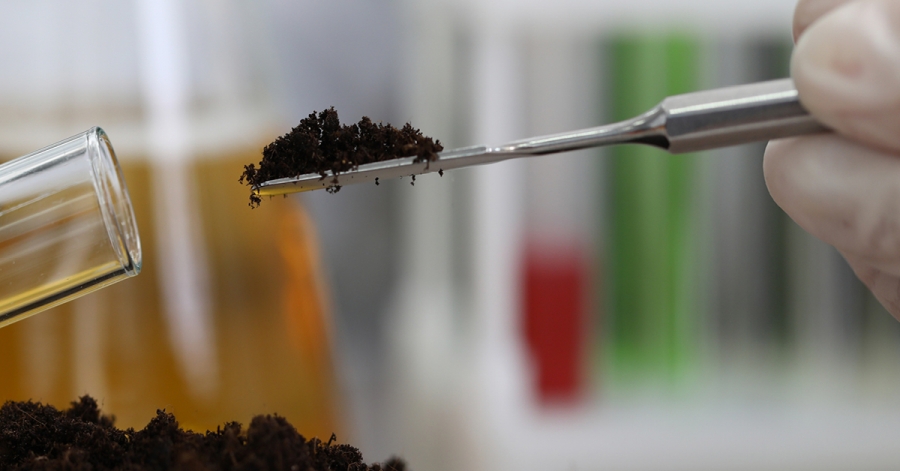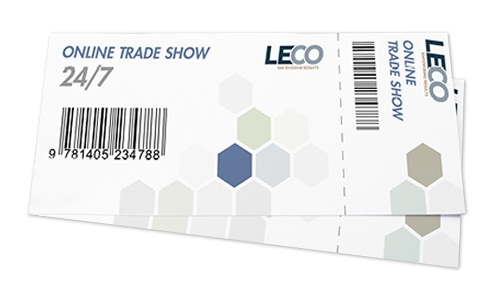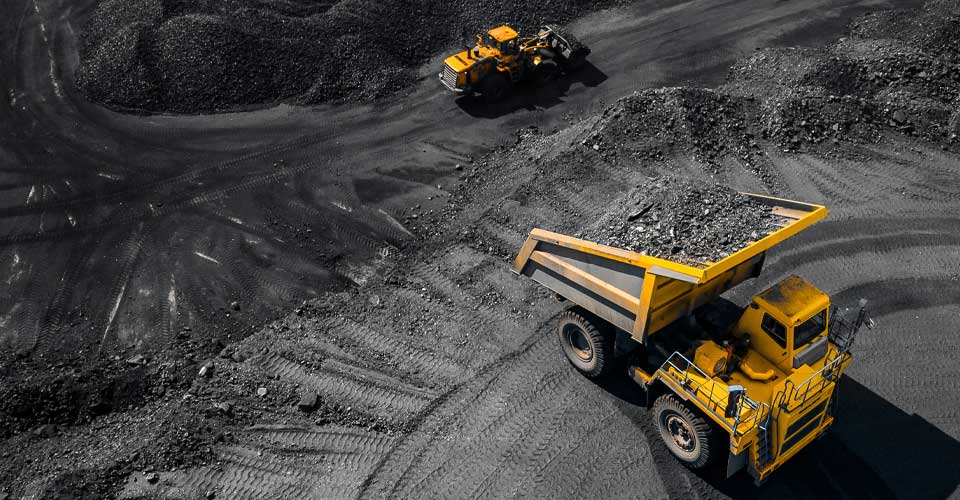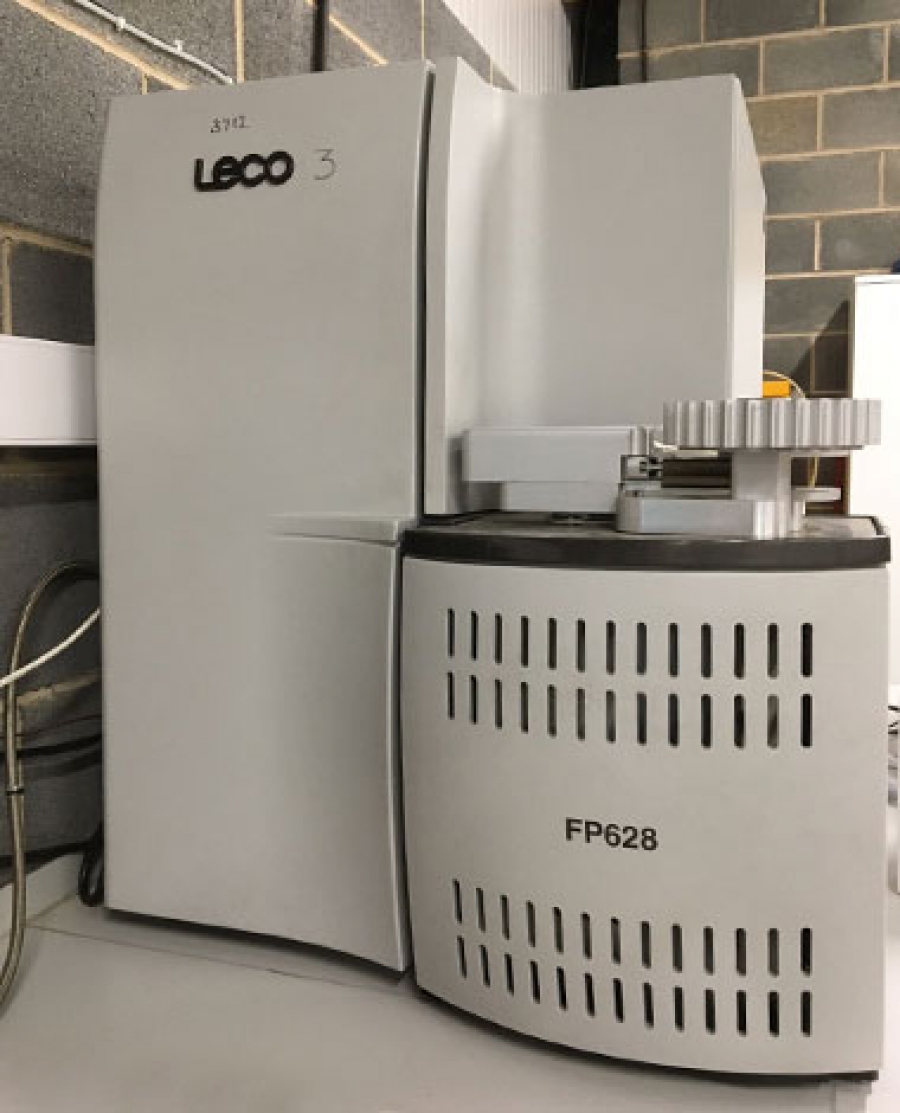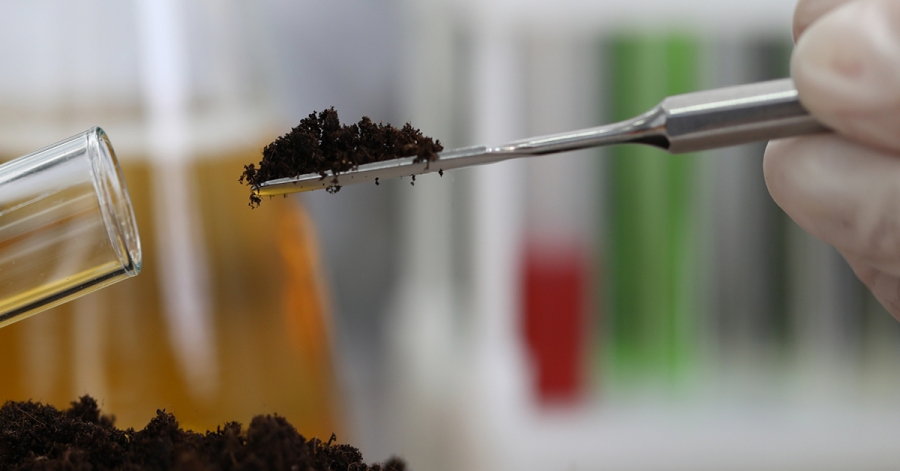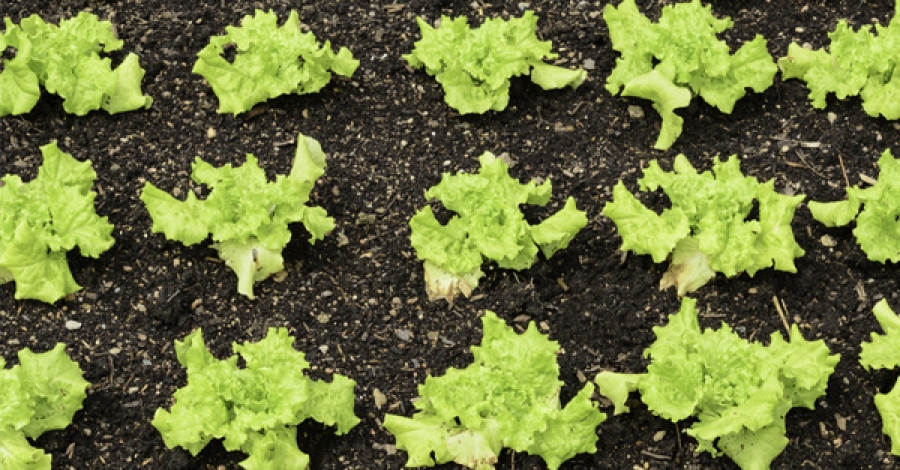
 LECO
Empowering Results
LECO
Empowering Results
Afficher les éléments par tag : Carbone
Soil is the material where corn grows. This sounds to be a simple sentence, but keep in mind, that a big part our food is directly or indirectly coming from plants that are sown, grown and harvested in agricultural soil. For modern agriculture especially when including environmental concerns, the chemical analysis delivers very important parameters for a complete characterisation of soil. LECO is the specialist for CNS and moisture/ash analysis in soil, as well as for Carbon species analysis like TOC/TIC or according to EN 17505 TOC400, ROC, ROC900 and TIC 900.
Your TOC analysis has never been easier with LECO’s solutions
Carbon is an essential building block of life on our planet. The amount of Carbon present is an important factor in soils and agriculture samples.
The determination of TOC in solids has recently become ever more important, not just for evaluating wastes but TOC content measurements are also an important aspect of assessing soils.
The Carbon present in soil organic matter is referred to as organic Carbon. Soil organic Carbon is a vital component of productive agriculture. In addition sequestration of Carbon in agricultural soils has been recognised as a tool to mitigate climate change.
LECO provides innovative and timesaving analytical instrumentation for the analysis of organic Carbon content.
Specific Advantages Including
- Market leading analytical performance
- Simplified sample preparation
- Robust & reliable instrumentation
- Unsurpassed instrument flexibility
- Adhering to all the current standards, such as ISO 10694, BS EN 17505 and EN 15936
Instrument Portfolio for TOC Analysis
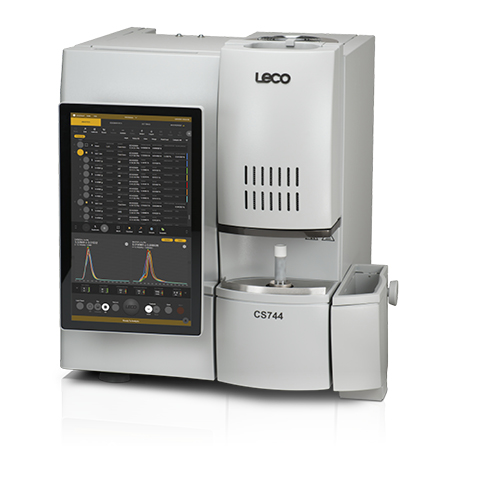
CS744 // Carbon analysis by combustion
Redefine the way you determine carbon in soils and plant tissues with our 744 series. Using extensive customer feedback and innovative engineering, the 744 takes advantage of our immersive CORNERSTONE® brand software platform and a number of features, ...
... such as an improved IR cell design and available automation, come together to increase usability, lab productivity, and lower your cost-per-analysis.

RC612 // Multi-Phase Carbon And Water Determination
Get fast, reliable carbon and water determination with our RC612. The RC612 is a resistance furnace multiphase carbon and moisture determinator which quantifies the carbon and moisture present in soils and plant tissues and illustrates the source of several types of carbon.
The RC612 features a state-of-the-art furnace control system, which allows the temperature of the furnace to be stepped and ramped from near ambient to 1,100 °C, in either oxidative or reductive carrier gas. The RC612 utilizes an afterburner furnace that ensures complete combustion of volatile species released at lower primary furnace temperatures.
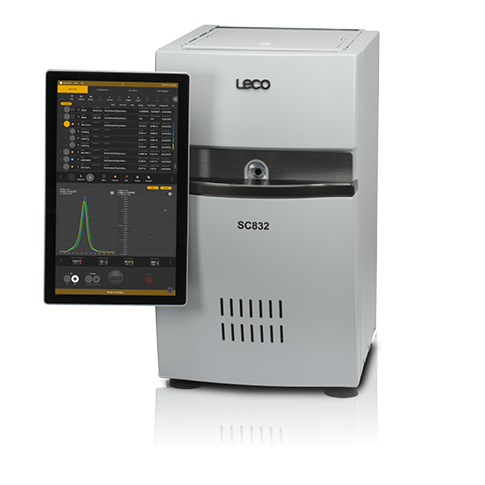
SC832 // Sulfur And Carbon Analysis
LECO’s 832 series of Elemental Determinators are specifically designed to perform carbon and sulfur analysis of soil, plant tissue and other organic and some inorganic materials. The 832 series is a valuable resource for any laboratory needing fast and accurate analysis.
Request SC832
Methods of TOC analysis include
1. Acid Digestion Method
The most common method for determining TOC is the acid digestion method. By acid treating a sample, usually with hydrochloric acid, which is strong enough to react with inorganic carbonates but does not react much with organic Carbon, the inorganic carbonate species within the sample will effervesce as Carbon dioxide. The acid-treated sample and a non-acid-treated sample can both be analyzed using either the LECO C744 series or LECO C832 series for Carbon content. The untreated sample would indicate the total carbon content, while the acid-treated sample’s Carbon content would be the remaining organic Carbon content. The difference between the two samples would be the total inorganic Carbon (TIC) content.
2. Temperature Dependent Method
Another Carbon determination method is temperature dependent. With the temperature dependent method, samples do not need to be pretreated. Organic Carbon combusts to CO2 between 150 °C and 450 °C, while inorganic species combust below 1,000 °C. The RC612 resistance furnace multiphase Carbon and moisture determinator performs this analysis by using a two-step temperature ramping at 450 °C and 1,000 °C without any acid pretreatment of the samples. The CO2 gases are swept through to an NDIR at 450 °C and again at 1,000 °C to determine the TOC and TIC in the sample.
For a more comprehensive exploration of these two methods, as well as an in-depth comparison of LECO instrumentation, please contact us:
On-demand Presentation // Watch the recorded Webinar
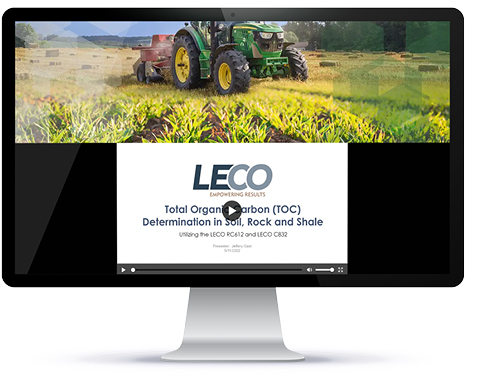
Détermination du carbone organique total (COT) dans le sol à l'aide d'un traitement à l'acide et d'une différenciation de la température
Presented by Jeffery Gast
The presentation will outline TOC determination in soil using two different approaches. First, we will explore the use of acid treatment of the soil to remove carbonates followed by analysis using conventional combustion techniques. Next, we will explore using a ramped furnace temperature approach to differentiate organic and inorganic carbon species. TOC results from both approaches will be presented.
Publication Library
Dive deeper into TOC analysis
Enhance your knowledge with our selection of publications. Discover techniques, comparisons, and applications in our downloadable resources, gaining valuable insights and enriching your understanding of Total Organic Carbon (TOC) analysis.
Click to download app note
- "Temperature-Dependent Determination of Total Organic Carbon (TOC) in Soil, Rock, and Shale" using RC612
- "Determination of Total Organic Carbon in Soil, Rock, and Shale by Acid Digestion and Combustion" using 832 Series
Click to download poster

If you want to learn more about our products and solutions for TOC analysis, book a free ticket to our Virtual Trade Show, or schedule an online demo for a deeper insight in our instruments.
Your TOC analysis has never been easier with LECO’s solutions
Carbon is an essential building block of life on our planet. The amount of Carbon present is an important factor in soils and agriculture samples.
The determination of TOC in solids has recently become ever more important, not just for evaluating wastes but TOC content measurements are also an important aspect of assessing soils.
The Carbon present in soil organic matter is referred to as organic Carbon. Soil organic Carbon is a vital component of productive agriculture. In addition sequestration of Carbon in agricultural soils has been recognised as a tool to mitigate climate change.
LECO provides innovative and timesaving analytical instrumentation for the analysis of organic Carbon content.
Specific Advantages Including
- Market leading analytical performance
- Simplified sample preparation
- Robust & reliable instrumentation
- Unsurpassed instrument flexibility
- Adhering to all the current standards, such as ISO 10694, BS EN 17505 and EN 15936
Instrument Portfolio for TOC Analysis

CS744 // Carbon analysis by combustion
Redefine the way you determine carbon in soils and plant tissues with our 744 series. Using extensive customer feedback and innovative engineering, the 744 takes advantage of our immersive CORNERSTONE® brand software platform and a number of features, ...
... such as an improved IR cell design and available automation, come together to increase usability, lab productivity, and lower your cost-per-analysis.

RC612 // Multi-Phase Carbon And Water Determination
Get fast, reliable carbon and water determination with our RC612. The RC612 is a resistance furnace multiphase carbon and moisture determinator which quantifies the carbon and moisture present in soils and plant tissues and illustrates the source of several types of carbon.
The RC612 features a state-of-the-art furnace control system, which allows the temperature of the furnace to be stepped and ramped from near ambient to 1,100 °C, in either oxidative or reductive carrier gas. The RC612 utilizes an afterburner furnace that ensures complete combustion of volatile species released at lower primary furnace temperatures.

SC832 // Sulfur And Carbon Analysis
LECO’s 832 series of Elemental Determinators are specifically designed to perform carbon and sulfur analysis of soil, plant tissue and other organic and some inorganic materials. The 832 series is a valuable resource for any laboratory needing fast and accurate analysis.
Request SC832
Methods of TOC analysis include
1. Acid Digestion Method
The most common method for determining TOC is the acid digestion method. By acid treating a sample, usually with hydrochloric acid, which is strong enough to react with inorganic carbonates but does not react much with organic Carbon, the inorganic carbonate species within the sample will effervesce as Carbon dioxide. The acid-treated sample and a non-acid-treated sample can both be analyzed using either the LECO C744 series or LECO C832 series for Carbon content. The untreated sample would indicate the total carbon content, while the acid-treated sample’s Carbon content would be the remaining organic Carbon content. The difference between the two samples would be the total inorganic Carbon (TIC) content.
2. Temperature Dependent Method
Another Carbon determination method is temperature dependent. With the temperature dependent method, samples do not need to be pretreated. Organic Carbon combusts to CO2 between 150 °C and 450 °C, while inorganic species combust below 1,000 °C. The RC612 resistance furnace multiphase Carbon and moisture determinator performs this analysis by using a two-step temperature ramping at 450 °C and 1,000 °C without any acid pretreatment of the samples. The CO2 gases are swept through to an NDIR at 450 °C and again at 1,000 °C to determine the TOC and TIC in the sample.
For a more comprehensive exploration of these two methods, as well as an in-depth comparison of LECO instrumentation, please contact us:
On-demand Presentation // Watch the recorded Webinar

Détermination du carbone organique total (COT) dans le sol à l'aide d'un traitement à l'acide et d'une différenciation de la température
Presented by Jeffery Gast
The presentation will outline TOC determination in soil using two different approaches. First, we will explore the use of acid treatment of the soil to remove carbonates followed by analysis using conventional combustion techniques. Next, we will explore using a ramped furnace temperature approach to differentiate organic and inorganic carbon species. TOC results from both approaches will be presented.
Publication Library
Dive deeper into TOC analysis
Enhance your knowledge with our selection of publications. Discover techniques, comparisons, and applications in our downloadable resources, enriching your understanding of Total Organic Carbon (TOC) analysis. Gain valuable insights by filling out our form to access the download files.
Download App Note
- "Temperature-Dependent Determination of Total Organic Carbon (TOC) in Soil, Rock, and Shale" using RC612
- "Determination of Total Organic Carbon in Soil, Rock, and Shale by Acid Digestion and Combustion" using 832 Series
Download Poster

If you want to learn more about our products and solutions for TOC analysis, book a free ticket to our Virtual Trade Show, or schedule an online demo for a deeper insight in our instruments.
Dr. Belen Morales, Head of Analytical Services from the Sheffield Assay Office in an interview with LECO
"[...] I have experience with LECO for years. To summarise is very, very simple. The reason why I bought the last machine from LECO, the Oxygen, Nitrogen, Hydrogen analyser was because in the market it’s the best in terms of practicality. The fact that I can do the multi element analysis at the same time for Oxygen, Nitrogen and Hydrogen is a really benefit for me. You do not have this in most other competitors. Also, the aftersales service is something that is perfectly working for LECO. We have service contracts with LECO on all our instruments and are very happy with the aftersales support we get. [...]"
Read the full interview here.
Wollen Sie Ihre Dumas-Analyse revolutionieren?
Dann brauchen Sie die richtige Lösung.
Durch die Integration modernster Hardware und unserer Touchscreen-Softwareplattform können Sie mit der 828 SERIE oder 928 SERIE eine Vielzahl von Probenanalysen erledigen. Die Vorteile und Leistungsmerkmale früherer Generationen von LECO Makro-Verbrennungsgeräten wurden beibehalten, während Durchsatz, Verfügbarkeit und Zuverlässigkeit entscheidend verbessert wurden. Alle Modelle der Serie 828 sind mit dem S832-Add-on kompatibel und ermöglichen eine separate Schwefelbestimmung. Makroprobenanalytik und Zykluszeiten von nur 2,8 Minuten machen die 828-Serie und 928-Serie zur idealen Lösung für eine Vielzahl von Anwendungen und bieten einen beispiellos hohen Probendurchsatz. Die unerreichten Makro-Fähigkeiten der 928 Serien mit den großen Verbrennungsschiffchen für feste und flüssige Proben stehen ebenso zur Verfügung.
Lassen Sie sich noch heute beraten!
Wir unterstützen und beraten Sie in allen Fragen rund um Dumas-Analysatoren wie auch Feuchte- und Ascheanalysen in Lebensmitteln und vielen weiteren Matrices.
Wir freuen uns auf Ihre Anfrage!

Sie möchten einen Dumas-Analysator, der …

... von 20 Servicetechnikern unterstützt wird, allein im Raum DACH/Benelux.

... eine korrekte Schwefelanalytik durch Hochtemperatur-Verbrennung liefert, auch mit 100% Recoveryrate.

... eine Reduktionschemikalien-Standzeit bis zu 4.000 Analysen hat, völlig egal was Sie analysieren.

... günstigste, laufende Kosten bei geringstem Wartungsaufwand bietet.

... eine kompromisslose Verbrennung in reinem O2 bietet ohne jede Matrix Abhängigkeit und weitere Infos über die Probe.

... schnelle Analysenzeiten bietet und auch im CHN / CHNS Modus nur ca. 5 Minuten benötigt.

... einen niedrigen Helium- / Argon-Verbrauch hat (1 Flasche ≈ 5.000 Analysen).

... Flüssigkeiten einfach ohne Zusatzmaterialien einwiegen kann.
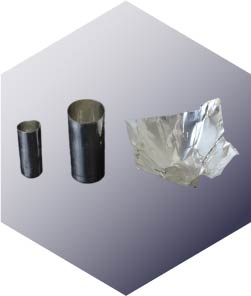
... kleine Kapseln, Folien und Gelkapseln sowie großvolumige Verbrennungstiegel flexibel verwenden kann (CHNS828).
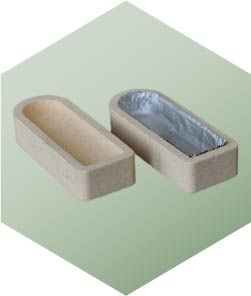
... ein traditionelles System mit Kapseln / Folien nutzt und eines mit großvolumigen Verbrennungsschiffchen (CNS928).

... die Trocknung der Gase mit einem hocheffizienten Thermokühler durchführt ohne weiteres Trägergas. Gilt nicht für H- und S-Varianten sowie CNS928.
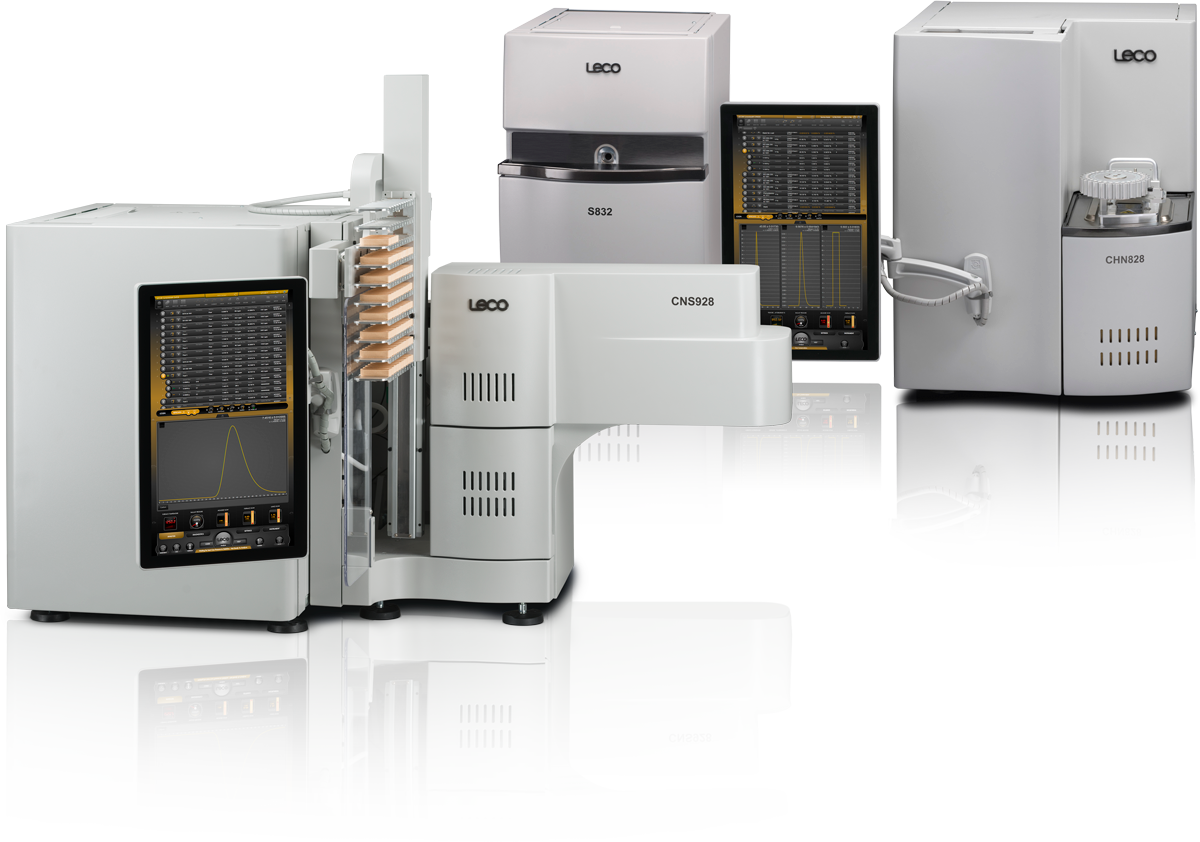
CHNS828 & CNS928 Serie – Vorteile und Merkmale
- Unerreichter Probendurchsatz optimiert Laborproduktivität
- Kurze Zykluszeiten von nur 2,8 Minuten für höchste Produktivität der FP/CN-Modelle
- Längere Lebensdauer der Reagenzien für eine optimale Betriebszeit des Geräts
- Einfacher Zugang zu üblichen Wartungsarbeiten reduziert deutlich Standzeiten und Dauer routinemäßiger Wartungsarbeiten
- Ergonomisches, bedienerzentriertes Design mit frei schwenkbarem Touchscreen
- Widerstandsfähiger Autoloader für 30 Proben mit optionaler Erweiterung auf 120 Proben maximiert die Laboreffizienz
- Verbesserte Ofeneffizienz und Zuverlässigkeit dank reagenzienfreiem Design
Kontaktieren Sie uns
ÜBERZEUGEN SIE SICH VON DER QUALITÄT UNSERER PRODUKTE
Lassen Sie sich von den LECO Experten unsere Produkte demonstrieren und testen Sie deren Leistungsfähigkeit! Kostenlos und wenn Sie wünschen auch kontaktlos bieten wir Ihnen dafür verschiedene Services an. Buchen Sie z. B. Ihr Ticket für unsere Virtual Trade Show oder vereinbaren Sie einen Termin für eine Online-Demo.
LiveLab, United Kingdom
"At Livelab we have always used LECO instruments for their accuracy and reliability, but also for their reputation. If a customer knows that we have tested their samples on the LECO, then they have an increased level of confidence in the results that is important to us. I have a bit of a reputation amongst our employees for having a soft spot for LECO instruments, precisely because of their reliability and also their ease to maintain. For us, they are the number one name in CNS determination, and to that end we have two SC144 instruments, two FP528 instruments and one FP628 Nitrogen determinators. Easy to use, rarely goes wrong, easy to fix if it does, and the top name in the industry – why use anyone else?"
Soil is the material where corn grows. This sounds to be a simple sentence, but keep in mind, that a big part our food is directly or indirectly coming from plants that are sown, grown and harvested in agricultural soil. For modern agriculture especially when including environmental concerns, the chemical analysis delivers very important parameters for a complete characterisation of soil. LECO is the specialist for CNS and moisture/ash analysis in soil, as well as for Carbon species analysis like TOC/TIC or according to EN 17505 TOC400, ROC, ROC900 and TIC 900.
Des matières premières aux produits finis, différentes industries font confiance aux analyseurs rapides et précis de LECO, qui mesurent la qualité et la résistance à chaque étape du processus de transformation des matériaux. En savoir plus sur l’analyse du carbone et du soufre par combustion avec LECO CS744 et CS844, la détection oxygène / azote / hydrogène avec l’ONH836, la détermination de l’oxygène/azote par fusion de gaz inerte avec l’ON736 et la détermination multiphase du carbone et de l’eau avec le RC612.
AMG Superalloys UK Ltd
"AMG Analytical has been working on LECO machines for over 25 years for the determination of O, N, C and S.
We embarked on a project working with LECO to bring Hydrogen testing in-house. The outcome of the project was excellent!
We have now purchased a LECO ONH836 machine and will offer the testing of Hydrogen to its external customers.
In our experience the level of commitment, technical expertise and support provided by LECO is unique within the industry.
We have no hesitation in recommending LECO to any company wishing to improve the efficiency of their operations."
D-Lab
"For our business as an accredited contract laboratory we need very flexible instruments that remain stable in the long run. Flexibility for the ever-changing levels of alloying elements and also for the lack of reference materials. We therefore need a versatile instrument for analysis and research, i.e. possible to separate, and for serving our customer with extended element range. We need top of the range instruments. D-LAB has for a long time used LECO Instruments for analysis of C S N O H.
We are very happy about the ranges that the instrument can handle!"
Chemical & Corrosion Laboratory
Cogne Acciai Speciali S.P.A.
« Mon entreprise utilise des instruments LECO pour l’analyse CSNH depuis 1973. Thousands and thousands of analyses, through day and night, in a steel shop laboratory… That’s hard work… both for the operator and the analytical equipment.
Depuis 1973, la précision et l’exactitude s’améliorent encore !
Une instrumentation robuste et fiable, tout simplement ! LECO...tout simplement ! »
Wallonian Agronomy Research Center
« Le Trumac CN est vraiment bon par rapport à Elementar et Thermo Flash. Voici les résultats d’une étude que j’ai menée en 2015. LECO TRUMAC est plus précis que les autres. One method fits all solid and semi-solid matrix, while with other instruments, the methods need to be customized for each sample matrix!"
Coal Services A.S.
"Our main instruments for 'fuel analysis' are LECO calorimeters AC500 & AC600, LECO TruSpec CHNS together with LECO CHNS628 and Thermogravimetric analyzers LECO TGA601 & TGA701. It could take us as little as 2 minutes per analysis and with the TGA we can simply load samples and continue working on other tasks! LECO understands the importance of our work and provides highly reliable services to keep these instruments in order. Thanks to remote consultation with LECO Service department they are never too far from us when we need help. Simply a great technology partner to have!"
Des récoltes bien équilibrées requièrent un sol bien équilibré. Le carbone est l'élément essentiel de la vie organique, mais un bon ratio entre l'azote et le soufre dans le sol, en plus du carbone, peut réellement influencer la vitesse et la richesse du développement de la plante. Avec un analyseur macro du carbone, de l'azote et du soufre par combustion tel que le CNS928, ces ratios peuvent être déterminés en une analyse rapide et fiable.
De nombreux fertilisants peuvent être utilisés pour modifier le taux des éléments dans le sol, mais sans connaître les teneurs de départ de votre sol, vous n'avez pas de moyen de connaître ce dont il a besoin. Le LECO CNS928 peut prendre en charge les incertitudes liées au contrôle de votre sol.
Alors que l'helium reste le gaz inerte de prédilection pour l'analyse élémentaire, l'approvisionnement est limité, ce qui revoit son coût à la hausse. Le CNS928 est conçu pour fonctionner sous helium ou argon comme gaz vecteur. La différence de conductivité thermique entre l'argon et l'helium n'est pas aussi grande que la différence de conductivité thermique entre l'helium et l'azote, donc le détecteur est moins sensible avec de l'argon pour l'analyse de l'azote, mais le CNS928 offre la possibilité de travailler avec une boucle aliquote plus grande de 10 cm3. La boucle aliquote de 10 cm3 permet de contrebalancer la moins bonne sensibilité de l'argon en gaz vecteur, en optimisant le système pour les plus basses teneurs en azote et apporte la meilleure précision.
Pour voir comment le CNS928 gère l'analyse du carbone, de l'azote et du soufre avec différentes combinaisons de gaz vecteurs et de tailles de boucle aliquote, n'hésitez pas à lire notre note d'application.
